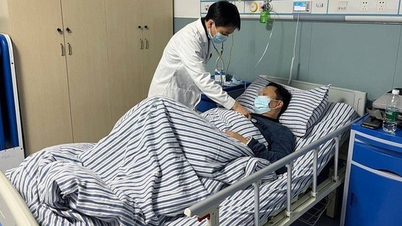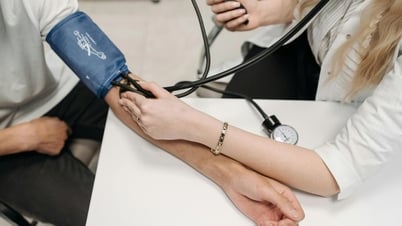
Sharing dipping sauce or serving food to each other with chopsticks can easily spread many diseases, including infection with H. pylori bacteria (also known as HP) - Photo: TTD
2/3 of Vietnam's population is infected with H. pylori bacteria
Many people often have symptoms of belching, indigestion, bloating, loss of appetite, and heaviness in the body. Later, the symptoms become more severe, most typically abdominal pain, nausea, and significant weight loss...
Through examination, the patient learned that he was infected with H. pylori bacteria, also known as HP, and feared that it would progress to stomach cancer.
Dr. Tran Thi Dong Vien - Head of Internal Medicine Department B, Hospital for Tropical Diseases (HCMC) - said that Helicobacter pylori (H. pylori) is one of the most common bacterial pathogens in humans, with an estimated half of the world's population infected.
Currently, H. pylori gastritis is considered an infectious disease, even when it does not cause symptoms or complications for the patient.
H. pylori is a common cause of chronic gastritis, gastric and duodenal ulcers, gastric cancer and MALT lymphoma.
Vietnam is a country with a high rate of H. pylori infection, with an estimated 2/3 of the population infected. The situation of H. pylori antibiotic resistance in our country is increasing and the situation of H. pylori reinfection is common in our people.
Explaining why many people are infected with H. pylori and why it persists, Dr. Vien said that H. pylori has special abilities that help it survive in the harsh environment of the human stomach.
In addition, they can also evade immunity, so once infected, H. pylori infection will be persistent and cannot limit itself.
Prevent the risk of progression to gastric and duodenal ulcers and stomach cancer
Dr. Vien added that H. pylori infection always causes gastritis, regardless of whether it causes symptoms or not. In most cases, patients will have no clinical symptoms.
In symptomatic cases, the patient will have clinical manifestations depending on the clinical picture of complications caused by H. pylori such as chronic gastritis, indigestion, gastric and duodenal ulcers, stomach cancer, etc.
Approximately 10% of patients infected with H. pylori will progress to gastric or duodenal ulcers and about 1% may progress to gastric cancer.
In addition to upper gastrointestinal manifestations, H. pylori can also cause other extra-gastrointestinal manifestations such as anemia, iron deficiency, primary immune thrombocytopenia, and vitamin B12 deficiency.
In addition, H. pylori has also been reported to be associated with neurological, cardiovascular, respiratory and dermatological diseases, however, more research is needed to confirm this association.
Eradication of H. pylori can restore the gastric mucosa, relieve symptoms, limit complications and thereby reduce the risk of gastric cancer. Nearly 75% of early-stage MALT lymphomas can be cured after successful eradication of H. pylori.
To limit the spread of H. pylori infection in the community, doctors recommend that people should not share eating utensils in the family, such as the same dipping sauce bowl, drinking from the same water cup, or serving food to each other.
Be careful when eating at roadside stalls because the hygiene of eating utensils at stalls is very poor and cannot completely eliminate H. pylori bacteria.
Kill flies and mosquitoes, keep dishes and chopsticks clean, and rinse eating utensils used in the family with boiling water.
For young children, adults should avoid kissing them, not feeding them by chewing and spoon-feeding them, and avoid the habit of using their chopsticks to stir or mix food during meals.
Parents should train children to wash their hands before eating and after using the toilet to prevent H. pylori infection in children.
 Fear when children are infected with HP bacteria
Fear when children are infected with HP bacteriaSource



![[Photo] In May, lotus flowers bloom in President Ho Chi Minh's hometown](https://vphoto.vietnam.vn/thumb/1200x675/vietnam/resource/IMAGE/2025/5/15/aed19c8fa5ef410ea0099d9ecf34d2ad)
![[Photo] Prime Minister Pham Minh Chinh receives Country Director of the World Bank Regional Office for Vietnam, Laos, Cambodia](https://vphoto.vietnam.vn/thumb/1200x675/vietnam/resource/IMAGE/2025/5/15/2c7898852fa74a67a7d39e601e287d48)
![[Photo] President Luong Cuong attends the National Ceremony to honor Uncle Ho's Good Children](https://vphoto.vietnam.vn/thumb/1200x675/vietnam/resource/IMAGE/2025/5/15/9defa1e6e3e743f59a79f667b0b6b3db)



























































































Comment (0)